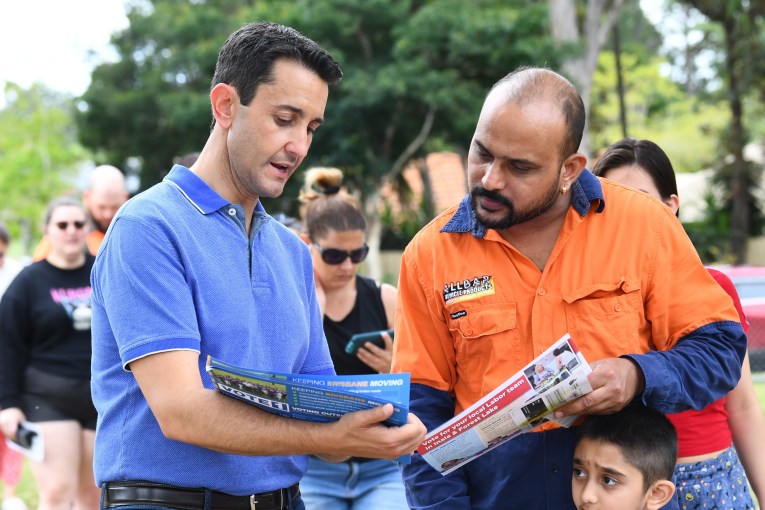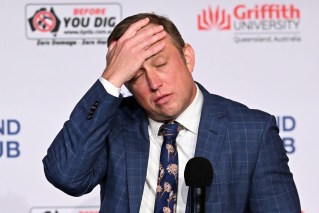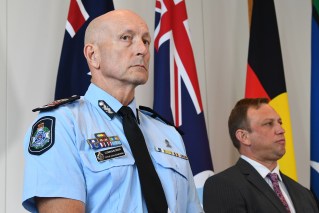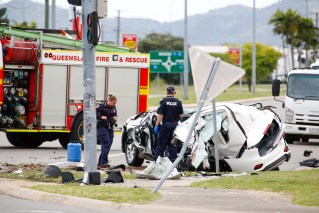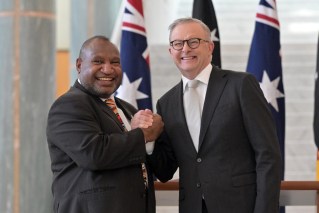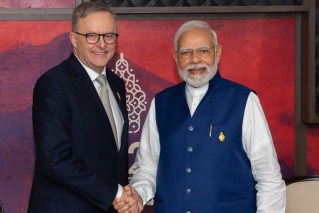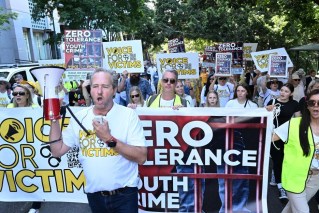One of the boys, perhaps, but it’s women who hold the keys to the Lodge for Morrison
With a growing band of female Australians standing for Parliament as independents in once secure Liberal seats, Scott Morrison is going to need more than his wife Jen to “clarify things” about how women are feeling, writes Dennis Atkins

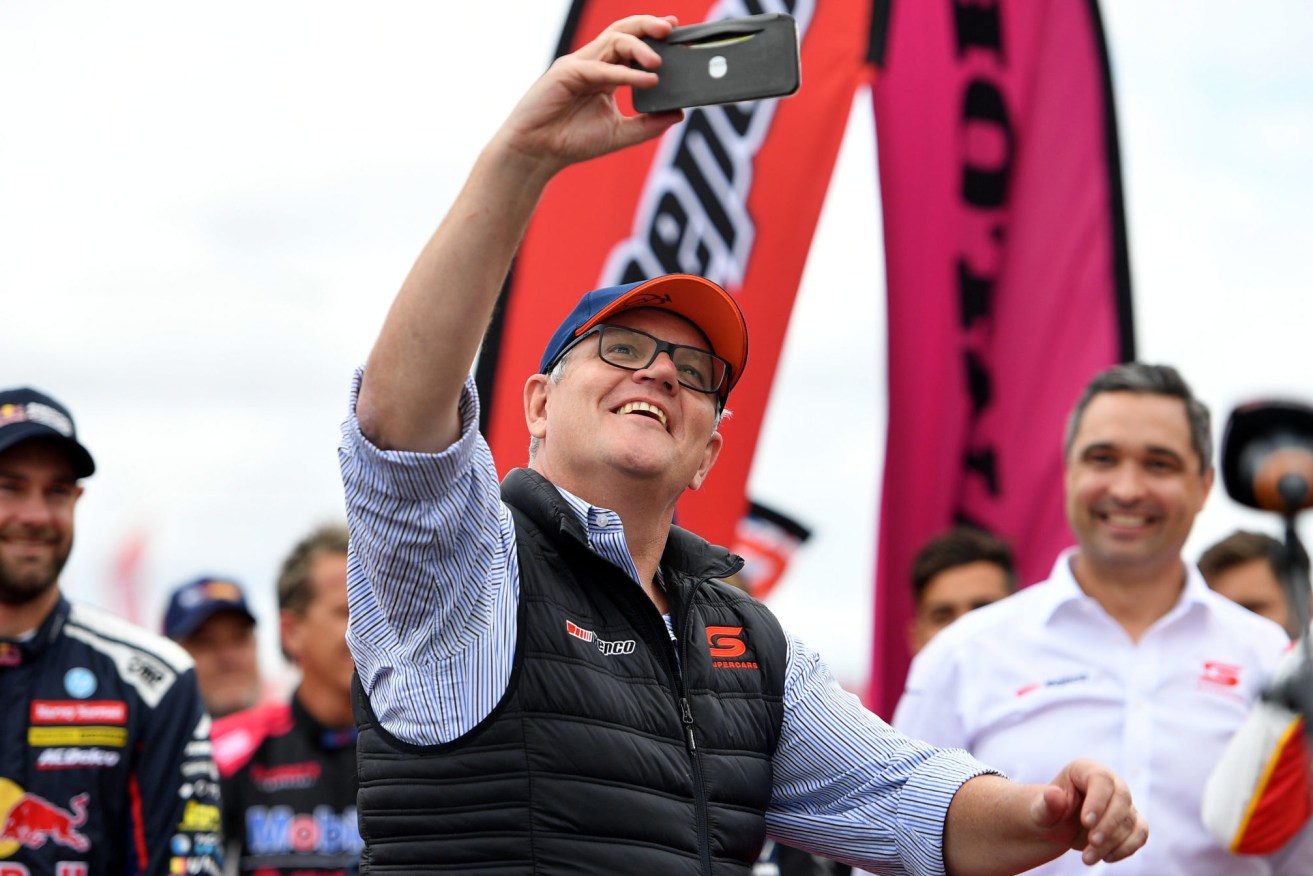
Prime Minister Scott Morrison takes a selfie with drivers on the grid ahead of the 2021 Supercars Championship Bathurst 1000 at Mount Panorama, in Bathurst, NSW, Sunday, December 5, 2021. (AAP Image/Dan Himbrechts)
Scott Morrison has a women problem and it’s going to get much worse. It might get bad enough to destroy his political ambition of being the first prime minister since John Howard to be re-elected at the polls.
Whichever way you look at Morrison’s political standing and fortunes there is a toughened strand of gender politics.
Just look at the last year: it began with what, in the hands of a mindful and considerate politician, might have been an opportunity to make an impact.
Grace Tame becoming Australian of the Year could have sparked so much, such as urgent implementation of Kate Jenkins’s unfinished business in the respect@work report, backed with resources for protecting domestic and sexual violence victims and other key issues such as social housing.
Instead Morrison hardly understood it. We didn’t find out until much later but his famous tin ear was on display when he quipped to Tame after her searing acceptance speech, “I bet it felt good to get that out”.
This was quickly followed by the bravery of Brittany Higgins who exposed the uncaring culture of government ministerial offices and the revelation about a young male staffer masturbating on a female MP’s desk.
No wonder tens of thousands of female Australians marched in some 40 cities and towns calling for an end to the blindness of our politicians. So many went to rallies for the first time.
Morrison managed to turn these events to his opponents’ advantage by reminding those at the rallies they were lucky they weren’t being shot at like the victims of repression in Myanmar and deflected a telling question at a news conference by wrongly calling out a journalist he said was the target of a harassment complaint.
Female voters, never enamored of Morrison, turned away from the prime minister in numbers that continue to threaten his political survival.
Polls showed the Coalition’s support among women slumping four points (from 41 to 37 percent) while holding steady at 41/42 per cent with men. In any election this movement could be decisive, particularly in one as close as next year’s contest is shaping up to be.
This negative trend follows what was an often unremarked, very poor showing by the Coalition in attracting women at the 2019 election.
The Australian Election Study, a nationally representative survey of voter behaviour run by the ANU and with 34 years of data under its belt, found the Liberal Party had the lowest proportion of women’s votes since 1987 in 2019.
Morrison had plenty of ground to make up but he’s done nothing about it. Quite the opposite. Now he’s facing an existential crisis driven by gender politics.
Journalist, author and broadcaster Jess Hill – whose landmark book on domestic violence See What You Made Me Do won the Stella Prize in 2020 – has just released a truly shocking Quarterly Essay, The Reckoning: How #MeToo is Changing Australia.
It chronicles the last few years of an ugly intersection between gender and politics in this country, often in such brutally honest and graphic detail you have to put the volume down now and then to gather composure.
It should be read by everyone and anyone standing for election at the coming poll. It is that vital.
Hill recalls a small detail from all that’s been said and done in the last 18 months, extracted from The Guardian in March this year when Katharine Murphy makes a precise observation about Morrison’s political motivation. “This prime minister speaks almost exclusively to one cohort of voters: men at risk of voting Labor,” wrote Murphy.
This sentence jumped off the page in a week when it couldn’t have been more obvious. The seven day period began with Morrison squeezing his blokeyness into a muscle car on Mount Panorama, prattling on about the exuberance of speeding, vaccines and looking at the road ahead while focussing on where we’d been.
Watching it in real time you felt the need for testosterone just to comprehend what it was all about.
The week ended with a soliloquy to the ute, delivered during a news conference in Charlemont, south of Geelong. “I love utes. How good are utes? And how good would a Big Ute be?” he asked, responding to a question about having a “big ute” locally as a tourist attraction.
Morrison went on to say real utes were better than big utes and he wanted to see more tradies in “real utes on worksites”.
The testosterone was flowing again.
Most of the ute drivers are probably going to stay with Morrison, although some will have moved to the questioning column, sick of his now world famous bullshitting and penchant for walking both sides of the street on all sorts of issues.
Where he is in real trouble is with women, which is why what happened in between these two blokey bookends is so much more important.
During the early part of the week Morrison made a very public, high pressure pitch for former New South Wales Premier – and corruption inquiry target – Gladys Berejiklian to run as a federal Liberal candidate in Tony Abbott’s old seat of Warringah (now held by independent woman Zali Steggall). This pitch failed.
While Liberal royalty like Berejiklian is turning Morrison down, other women who might stand for the Coalition in another time, another place are volunteering to run in metropolitan seats against sitting Liberals, most of whom used to be called moderates, and in some places where things are more competitive because of retirements.
The latest – and perhaps among the most dangerous for Morrison – is former Adelaide Writers Festival director Jo Dyer who has shown her card to stand in the Liberal seat of Boothby, an open electorate after the retirement of Nicole Flint.
Dyer came to national prominence as the leader of the campaign for justice for her friend Kate, the Adelaide historian and debater who committed suicide after overwhelming anguish following an alleged historical sexual assault by Christian Porter, who went on to become Australia’s attorney general in the Coalition government.
A Western Australian who has quit the cabinet and will not stand again for parliament, Porter denies all of the allegations made against him.
Dyer’s presence is a sharp reminder of a particularly jarring episode from a year that has struck a nerve in women across the country.
Two other high-profile independent challengers are Allegra Spender, running a well resourced campaign in Malcolm Turnbull’s old seat of Wentworth against Liberal Dave Sharma, and former ABC journalist Zoe Daniel, who has put her hand up in Goldstein in Melbourne’s south east.
Elsewhere, Georgie Steele, a globetrotting lawyer now settled in Sydney’s Sutherland shire, is pitching for Hughes (held by big noting Clive Palmer pal Craig Kelly); Kylea Tink, CEO of the cancer charity the McGrath Foundation is lining up in the North Sydney seat held by Trent Zimmerman, while general practitioner Sophie Scamp has a tougher task in the 12.5 percent seat of Mackellar.
Others are likely to join the sweep (including one or two in south-east Queensland) and if just a quarter of them are successful – not entirely fanciful in this most uncertain of political times – Morrison’s electoral mortality would be in doubt.
That women problem is a clear and present danger for our ute loving, muscle car riding national leader. No wonder Anthony Albanese has changed his tunes and tones accordingly and is doing lots of media appearances in settings more appropriate for those who care about the caring economy, such as child care centres.
